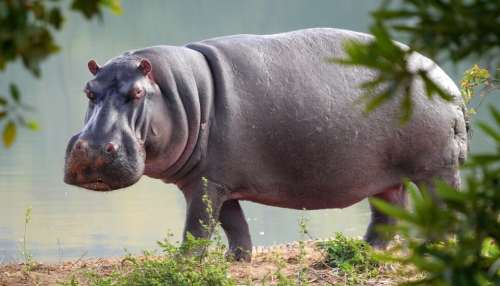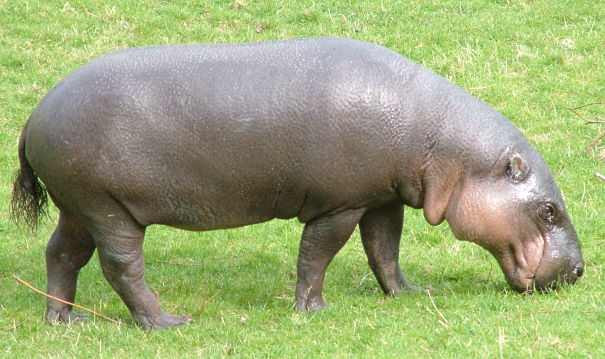Do hippos have hair? One of the most surprising things about hippos is that they don’t have any hair on their bodies. This might seem like a minor detail, but it actually makes them very different from other animals. Most mammals have fur or hair that helps to protect them from the elements and keep them warm.
Table of Contents
But because hippos don’t have any hair, they have to rely on other means to stay warm and safe. For example, they often huddle together in groups to stay warm, and they secrete a special oil that helps to waterproof their skin. The only areas on their body that contain any hair are a small patch in front of the mouth and the tip of the tail. This lack of hair helps to keep them cool in the hot African climate.
The hippopotamus is a massive mammal that is equally at home on land and in water. Their bodies are heavily armored with a thick layer of skin, which helps to protect them from predators. This skin also has a special waterproofing agent that keeps the hippo from getting wet when they are submerged.
However, the hippo’s skin is very sensitive to sunlight, and they can quickly get sunburned if they stay out of the water for too long. As a result, hippos often spend the daylight hours submerged in cool water, coming out to feed on grasses and other plants at night.

Do hippos have fur?
In reality, hippos have only a few tiny bristles of fur on their mouths and at the end of their tails. These bristles are so small that they are barely noticeable, and they do not provide any real protection from the elements. So next time you see a picture of a hippo, don’t be fooled by its furry appearance – this impressive animal is actually bald as a bean!
The thickest skin of any land animal belongs to the hippopotamus. This factoid is made even more impressive when you consider that the average hippo weighs in at a whopping 3,300 pounds. The skin of a hippo called “the hide” can be up to 5 centimeters thick, which is about 2 inches.
This thick skin is purple-grey in color and is completely bereft of wool. The main purpose of this thick skin is to protect the hippo from punctures and scratches as they wallow in the water or mud. This tough hide also helps to regulate their body temperature and ward off parasites.
Hippos are most commonly found in Africa, where they spend the majority of their time wallowing in mud or water. While this may seem like a lazy lifestyle, there is actually an important purpose behind it. The mud helps to protect their skin from the harsh African sun, and the water keeps them cool and hydrated. Indeed, hippos are able to secrete a special substance that acts as both sunscreen and moisturizer.
As a result, they are able to stay submerged for long periods of time without suffering any ill effects. However, hippos are not entirely aquatic creatures and must return to land occasionally to graze on grasses.
There are a number of similarities between the skin of aquatic mammals and that of other animals like Hippos. As their name suggests, these animals live in water, and their skin helps them to move through the water with ease.
Unlike other mammals, their skin is bald and has no hair, which reduces drag and makes it easier for them to swim. This matches the skin of hippopotamuses with little fur which they developed on the land.

Why Hippos Don’t have hair?
Have you ever wondered why hippos don’t have hair? It’s a bit of a mystery, but there are some theories. One theory is that it helps them stay cool. Hippos are large animals and they can get hot easily, so being bald helps them stay cool. Another theory is that it helps them in the water. Hippos spend a lot of time in the water and being bald helps them stay wet for longer periods of time. Whatever the reason, nature decided that hippos should be bald and we think it looks pretty good on them!
It is a common misconception that hippos sweat blood. In fact, hippos do not have any wool, and their skin does not have any natural sweat glands. Instead, they excrete a thick, reddish liquid from their pores. This liquid helps to create a layer of mucous on the skin, which protects the hippo from sunburn. during the day, hippos often wallow in canals or other bodies of water to keep their skin moist.
However, the mucous produced by the reddish liquid also helps to keep the hippo’s skin moisturized even when they are out of the water. This unique substance plays an important role in protecting hippos from the harsh African sun.

Why Hippos Have No Hair Story
Bald hippos are a popular subject of African folklore. According to one legend, hippos used to have a beautiful coat of wool. The vain animals would spend hours gazing at their reflections in rivers and canals, believing themselves to be the most beautiful creatures around. Unfortunately, one day a hippo decided to mock a hare for being ugly.
The hare took offense and asked the gods to punish the hippo by making him bald. And so it was that the hippos lost their beautiful coats and have been bald ever since. Whether or not you believe the legend, there’s no denying that bald hippos are an intriguing sight!
Final Words
Although many terrestrial and aquatic mammals are bald, hippopotami are an exception. They are largely hairless, with only a small amount of fur on their mouths and tails. Although they may not look it, hippos are actually quite sensitive to the sun. The sparse fur that they do have helps to protect them from the harsh rays of the sun.
Read our other Hippo blogs below:
- What Color is Hippo Milk? Is It Really Pink?
- Can A Hippo Bite Crocodile in Half? Is it Real or Not
- Elephant Vs Hippo: Who will Win in the Fight?
- Hippopotamus Teeth: Everything You Need to Know
- How Fast Can a Hippo run? Hippo’s Land & Water Running Speed
References:
https://www.nationalgeographic.com/animals/mammals/facts/hippopotamus
https://a-z-animals.com/blog/hippo-milk-the-real-story-why-its-pink/
https://blogs.scientificamerican.com/tetrapod-zoology/a-quick-history-of-hippopotamuses/
https://www.britannica.com/animal/hippopotamus-mammal-species
https://www.nationalgeographic.com/animals/mammals/facts/hippopotamus
https://ielc.libguides.com/sdzg/factsheets/hippopotamus/taxonomy

Zahra Makda
Growing up enjoying the beauty of my village, a good passion for nature developed in me from childhood. Following my passion for the natural world, I have chosen zoology for my graduation, during my undergraduate degree, I participated in many nature trails, bird watching, rescues, training for wildlife conservation, workshop, and seminars on biodiversity. I have a keen interest in invertebrate biology, herpetology, and ornithology. Primary interests include studies on taxonomy, ecology, habitat and behavior.









